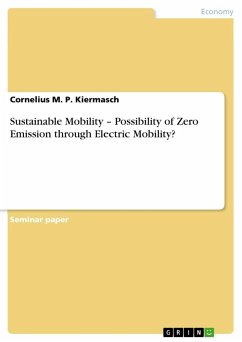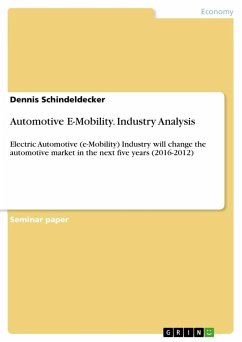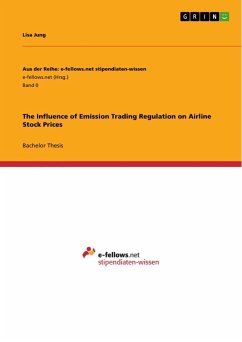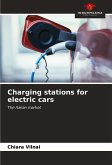Seminar paper from the year 2010 in the subject Business economics - Miscellaneous, grade: 1,3, Carl von Ossietzky University of Oldenburg (Department of Business Administration and Education), course: International Sustainability Management, language: English, abstract: Climate change and the negative impact that various human activities can have on our ecosystem are among the inescapable challenges world leaders are facing. While the issue of global warming remains highly debated, there is increasing evidence to support the environmental impact of carbon emissions. It is estimated that the transport sector is responsible for roughly 18% of carbon emissions in Germany. In future, greenhouse gas emissions will have to be reduced in the transport sector and due to the globally growing demand for energy in emerging markets and the risk of shortages prices of fossil fuel are bound to rise considerably. Accordingly mobility re-quires a sustainable development path towards zero-carbon emissions. In consequence, the importance of alternative drive technologies is growing. Battery electric vehicles (BEV) are seen as one possible solution since they release no carbon emissions while running on electric power and are obviously low-noise. However, some question whether BEVs are truly "clean vehicles" because in some cases, the electricity used to power the vehicles is produced by high polluting coal power plants and a lot of energy is required to produce the batteries. In addition past development of battery-electric vehicles showed that the technology was not yet sufficiently mature due to low ranges and high prices to meet the requests of potential users. Thus, several require-ments need to be met to achieve a market acceptance which is sufficiently big to be considered a critical mass providing the way to sustainable mobility. According to the open questions above which are associated with an alternative drive technology, this paper first gives an understandingof sustainable mobility and shows respectively goals (Chapter 2). Chapter 3 provides an overview of greenhouse gas emissions due to transport sector in Germany and consumer's mobility characteristics and behaviour in order to analyse in Chapter 4 whether zero emission would be possible by BEVs. For this analysis three areas are focused: economically, ecologically and operating characteristics.








